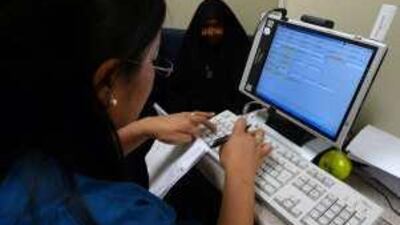AL MARFA // "I heard about breast cancer three years ago, but I did not come until now," says Ayesha Ahmed Hassan. "I want to examine myself because I heard about breast cancer, and also because I want to renew my Thiqa card."
Mrs Hassan, 64, is visiting the Health Authority-Abu Dhabi's new mobile breast cancer clinic as it rolls through Al Gharbia. She lives in Al Marfa, more than 100km west of the capital, and says she could not make the journey to Abu Dhabi or Al Ain. But with the new clinic on wheels, Mrs Hassan, along with the rest of the women in the region, no longer needs to. As well as a mammography machine, the unit has a counselling room, where women learn about the importance of being tested and how to examine themselves.
Since it was announced that Emirati women over 40 would have to have a mammogram to renew their Thiqa health insurance cards, the number of women seeking examinations has more than doubled, from between 10 and 15 women a day to more than 35 now. "At first they did not understand the concept, so in the morning there were not that many people coming," says Enas Ensawi, the charge nurse who runs the mobile unit. "Once they heard about it they came in large numbers."
Yesterday the staff worked from 6am to 6pm. Around half the patients did not have appointments. "This is happening everywhere," says Magda Makaram, the clinic's clerk. "We have to travel to different places and help these women because they don't know about breast cancer." It is hoped the clinic will help make more early diagnoses of breast cancer, which has a big impact on survival rates. The UAE is well behind many western countries, and only 30 per cent of diagnoses being in the early stages of the disease. And yet, according to the National Cancer Registry, it accounts for 22.8 per cent of all the UAE's cancer cases.
Mrs Ensawi is enthusiastic about the compulsory screening. "This is a fantastic idea," she says. "In the beginning people will see it as pushing or putting people in a corner but it is for their benefit. There is a tremendous number of people who did not know about this service." The challenges of raising awareness of breast cancer in remote areas are different to elsewhere in the emirate, with the lack of information exacerbated by the high rate of illiteracy among older women.
More than one in five women over 40 in Al Gharbia is illiterate, according to the health authorities. This limits the value of the usual poster and leaflet campaigns. To bring women in for their appointments, nurses from local clinics will call to let them know when the mobile clinic is coming. Although their doctors may have suggested the test, many women will not take the trip to Abu Dhabi or Al Ain, around three hours away, to be screened.
"It is important for remote areas like the Western Region," says Mrs Ensawi. "We call it the Western Region but it is not only one place. It is five or six different areas and every city is far from each other. "We can't put one mammogram machine in every place so we do this to reach the ladies. "It is easier for them and they don't have to go to Abu Dhabi, which can be a four-hour trip." The women who arrive for their scheduled appointments often come with a friend or family member to take advantage of the mobile clinic for the few days that it is in town.
Hamda Jassim, 50, made the journey from her home in Madinat Zayed for a second time because her X-rays showed some spots which needed to be checked. This is common in mammograms and does not necessarily mean she has breast cancer. "I have never been tested for breast cancer before," she says. "I am excited that the Government is supplying this. I believe in God and it is in God's hands whether I get it, so I have no fear of breast cancer. If I have a problem I will accept it."
amcmeans@thenational.ae

